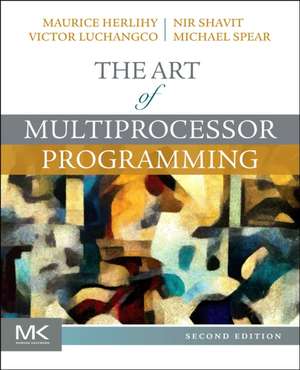The Art of Multiprocessor Programming
Autor Maurice Herlihy, Nir Shavit, Victor Luchangco, Michael Spearen Limba Engleză Paperback – 30 dec 2020
- Features new exercises developed for instructors using the text, with more algorithms, new examples, and other updates throughout the book
- Presents the fundamentals of programming multiple threads for accessing shared memory
- Explores mainstream concurrent data structures and the key elements of their design, as well as synchronization techniques, from simple locks to transactional memory systems
Preț: 339.29 lei
Preț vechi: 512.63 lei
-34% Nou
Puncte Express: 509
Preț estimativ în valută:
64.93€ • 70.51$ • 54.54£
64.93€ • 70.51$ • 54.54£
Cartea se retipărește
Doresc să fiu notificat când acest titlu va fi disponibil:
Se trimite...
Preluare comenzi: 021 569.72.76
Specificații
ISBN-13: 9780124159501
ISBN-10: 0124159508
Pagini: 576
Dimensiuni: 191 x 235 x 30 mm
Greutate: 1.15 kg
Ediția:2nd edition
Editura: ELSEVIER SCIENCE
ISBN-10: 0124159508
Pagini: 576
Dimensiuni: 191 x 235 x 30 mm
Greutate: 1.15 kg
Ediția:2nd edition
Editura: ELSEVIER SCIENCE
Public țintă
Students in multiprocessor and multicore programming courses and engineers working with multiprocessor and multicore systems.Cuprins
1. Introduction
2. Mutual exclusion
3. Concurrent objects
4. Foundations of shared memory
5. The relative power of synchronization operations
6. Universality of consensus
7. Spin locks and contention
8. Monitors and blocking synchronization
9. Linked lists: The role of locking
10. Queues, memory management, and the ABA problem
11. Stacks and elimination
12. Counting, sorting and distributed coordination
13. Concurrent hashing and natural parallelism
14. Skiplists and balanced search
15. Priority queues
16. Scheduling and work distribution
17. Data parallelism
18. Barriers
19. Optimism and manual memory management
20. Transactional programming
Appendix A: Software basics
Appendix B: Hardware basics
2. Mutual exclusion
3. Concurrent objects
4. Foundations of shared memory
5. The relative power of synchronization operations
6. Universality of consensus
7. Spin locks and contention
8. Monitors and blocking synchronization
9. Linked lists: The role of locking
10. Queues, memory management, and the ABA problem
11. Stacks and elimination
12. Counting, sorting and distributed coordination
13. Concurrent hashing and natural parallelism
14. Skiplists and balanced search
15. Priority queues
16. Scheduling and work distribution
17. Data parallelism
18. Barriers
19. Optimism and manual memory management
20. Transactional programming
Appendix A: Software basics
Appendix B: Hardware basics
Recenzii
"The book is largely self-contained, has countless examples, and focuses on what really matters. As such, it is very well suited for both a teaching environment and for practitioners looking for an opportunity to learn about this topic...The book is written in a way that makes multiprocessor programming accessible. This updated version will further confirm its status as a classic." --ComputingReviews.com, 2013
